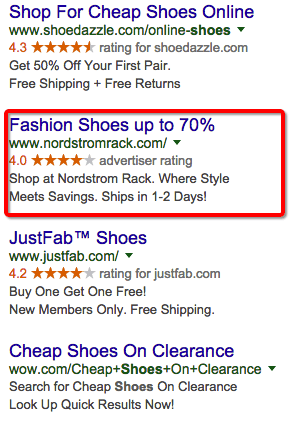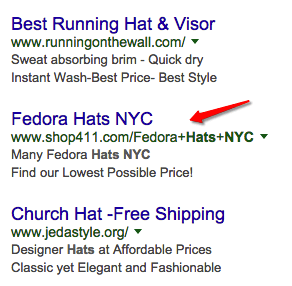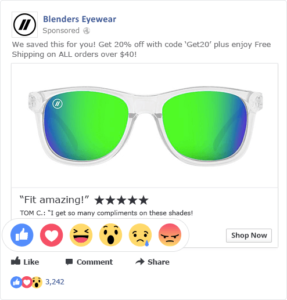As ad blocker usage increases, marketers are desperately trying to reach the internet masses.
While there’s nothing you can do about ad blockers, what you can do is reduce PPC waste and protect your digital budget by creating ads people actually want to see.
For eCommerce marketers, strategic ads can help you waste less and invest in the ads that have the highest CTR and best conversion rates.
As Yotpo’s first Head of Acquisition, I spent my days creating and testing the best ads and maximizing my PPC budget.
I want to share some of my top PPC and AdWords tips on how to get the most bang for your buck by creating ads that will get people to pay attention.
1. Add an Offer to the Headline
An offer is always eye-catching. But remember to play with different ways of displaying the discount — sometimes it’s better to advertise the percentage of the discount rather than the dollar amount. There are several options for structuring your offer.
For example, the company below advertised a great discount (70% off and free shipping), but the way they formulated the headline buries the exciting numbers by showing 40% first. This is a great opportunity to run tests and see how different phrasing affects click-through-rate.

In contrast, Nordstrom Rack made their discount super clear. They also used “up to” in their phrasing, allowing them to offer smaller discounts on the site, while still getting people to click through by showing their best discount.

PPC tip: Share discounts in your headlines. And when you do, always test how tiny tweaks impact your results.
2. Use Questions in AdWords Campaigns
Questions engage the user. If a shopper searched for “shoes” on Google, he or she might be more prone to click on your ad if it looks like this:

Than if it looks like this:

PPC tip: Using a question in your AdWords campaigns can help you stand out in search results. This is especially true when you’re lower down the page — if you’re the only site using a question in your ad, you’ll stand out from the pack.
3. Target the Right Audience With the Right Ad
With both Google and Facebook, it is extremely important to match the ad to the audience you are targeting.
On Google, if you are targeting a certain keyword, adding the actual keyword to the ad will instantly improve your CTR and quality score.
If you are targeting a certain location, it’s even better to add the actual location to the ad.

When it comes to creating effective Facebook ads, you have the opportunity to target, for example, different age ranges, genders or locations, so you should change the creative you use accordingly. Don’t present the same ad creative to different demographics.
In addition to testing different creative among different audiences, it’s also smart to test different product ads separately by age, gender, and location. A 50-year-old woman in New York is likely interested in different products than a teenage boy in California.
If you have a lot of products and a decent amount of traffic, you can also try to test dynamic re-marketing for product ads on Facebook and Google.
PPC tip: Don’t just put the same ad everywhere. It’s important to customize your creative for the specific audience you’re reaching in order to get the best results.
4. Refresh Your Creative Constantly
Varying creative is not just a way to appeal to different demographics, it’s the heart and soul of your ads.
So, while you should always test to see what works best for each target audience, you should also avoid sticking with the same creative for too long (even if it’s been working well). The last thing you want is stale creative.
According to what we learned at a workshop from Facebook, creative drives an average of 40% to 60% change in ad performance.
Even if you use 10 different optimization tools to create and adjust the perfect audiences, bad creative just won’t work.
And just as bad ads fail, so too do tired ones. Make sure your brand doesn’t become synonymous with a single old ad.
PPC tip: Invest resources first and foremost in fresh, high-quality creative.
5. Never Stop Testing Everything
If there is one rule you need to follow when running PPC campaigns, it is: never stop testing. And test everything.
Even when you think there is no room for improvement, you’ll be surprised how even one little change can make a difference.
Any time you want to change something in your ad — the copy or the image — it’s always better to test it first, so you have the data to back up your choices.
Testing can also help you prove that something doesn’t work, and then you’ll know not to use it again.
Take a look at the test we ran. At first glance, the two ads seem almost identical, but changing the button on the banner to say “Read our guide” instead of “Download eBook” increased CTR by 50%!


Additionally, we tested these two ads, one of which emphasized authenticity in the headline, the other which emphasized online product reviews and only mentioned authenticity in the body text.


We went into this test assuming authenticity in the headline would win — but the results surprised us: the second ad increased CTR by 67%
PPC tip: Test everything and make no assumptions. A lot of the test results will surprise you.
6. Improve Your Landing Page
Improving your landing page seemingly has nothing to do with ad improvement.
But when you make changes to increase the quality of your landing page, you also improve your Google ad quality score.
When determining your quality score, Google looks at the relevance of your landing page (bounce rate etc.), to see if your offer is really valuable.
If a user clicks on your ad and gets to an irrelevant landing page, your quality score will plunge, your CPC will rise, and you will pay more per conversion.
PPC tip: Make sure your landing page matches your ads, or be penalized by Google.
7. Don’t Forget the Power of Google Seller Ratings
Google Seller Ratings stars are a major CTR booster. They show star ratings of businesses to customers who are searching for specific items.
This means that they target the customer when they’re ripe for purchase: they know what they want, and they’re just comparing the different stores that offer the product.
Stars have an enormous influence on customers’ behavior and purchasing decisions. Not only do they draw the viewers’ eye and immediately communicate trustworthiness and quality, but when everyone has them, not having them can make your ad look worse in comparison.
PPC tip: Make sure you’re on the right track — to get Google Seller Ratings stars, you first need to collect reviews from your shoppers. These reviews can boost your results from Google searches as well as improve your overall SEO.
8. Convey a Sense of Urgency Through Scarcity
You’ve probably heard of the famous study in which people were presented with two jars of cookies.
One jar had 10 cookies and the other one had just two.
The participants were asked to rate the cookies.
Even though all the cookies in all the jars were identical, the cookies from the less-full jar were rated twice as high as the cookies from the fuller jar.
This shows that when people think there is less of something, they want it more. It explains why stores who display “Only 8 left at this price!” or other scarcity indicators, get more sales. FOMO (fear of missing out) can spark serious purchase urgency.
PPC tip: Conveying a sense of scarcity (“Just 5 minutes left for this sale!”) will accelerate conversion rates and CTR.
9. Include Social Proof
Social proof is a good way to get people to make decisions faster. In a 1998 experiment, David B. Wooten showed that when deciding whether to buy a certain product, people based their decision on other people’s ratings of that product.
Blenders Eyewear recognized the power of social proof in ads, and they started using reviews in their Facebook Dynamic Product Ads. The impact was huge, with 2x the CTR and a 38% drop in cost per acquisition.

Not only that, but when you use customer reviews to do the talking, you get high-quality creative without spending resources in-house — it’s a win-win situation! Also, when you get a lot of reviews, you can continuously update your ads with fresh new content.
PPC tip: By adding testimonials, reviews, customer photos, or other social proof to your ads, you can easily show potential buyers that others’ opinions of your product are positive.
Conclusion
Follow the tips in this post and invest in top-notch creative to take an average ad and make it amazing. And don’t forget to keep testing — there’s always room for improvement!




